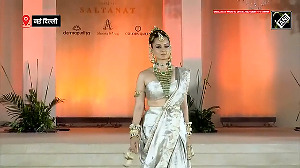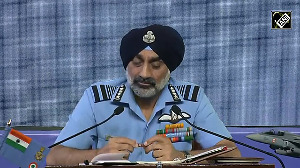Democratic Party stalwart and fund-raiser Ramesh Kapur, who has created yet another Indian American group called the Indian American Security Leadership Council, created solely for the purpose of pushing the US-India civilian nuclear agreement through Congress, has said the rationale behind his organisation roping in the support of a coalition of veterans groups endorsing the deal was to prompt reticent Democrats in Congress to support the accord during the House and Senate floor votes.
Kapur, whose organisation, has retained the Washington, DC-based lobbying firm of Bonner & Associates -- who helped convince the veterans groups to endorse the deal and argue that the deal is good for America for its national security interests told rediff.com that he had a strategic reason for soliciting the support of these groups because he believed their support would prompt Democrats in both the House and Senate who had reservations about the agreement, to vote yes because "as a Democrat, I know what our Achilles heel is -- always national security."
"And here are the veterans organisations endorsing the deal saying it's important for national security reasons. This should prompt Democrats to do so too," he added, acknowledging that his Indian American Security Leadership Council was paying for the full-page ad take out by these groups in the bi-weekly newspaper Roll-Call that exclusively covers Congress.
"It's very strategic and it's to get all the Democrats to come along," he reiterated, and said, "For the Republicans, it's the fear of God that prompts them to vote one way or the other, and in my view, for the Democrats, it's the fear of national security."
"And now, if the veterans organisations are supporting it and saying they are doing so for strategic reasons, there is no reason for the Democrats not to do so," Kapur, a trustee of the Democratic National Committee, argued.
Kapur, a Boston-based entrepreneur and a longtime fund-raiser for the likes of Massachusetts Senators Edward M Kennedy and John F Kerry, explained, "What's of great concern to the Democrats, is what will happen to the NPT(Nuclear Nonproliferation Treaty) if this deal goes through. For them the NPT is an emotional issue and the NPT base is a large base for the Democrats."
"The NPT people are not being practical, they are making it an emotional issue and that's why some Democrats are in a corner. So this (the veterans groups endorsing the deal) will make the Democrats also look at the national security angle," he said.
Kapur claimed that this was the first time such a large coalition of veterans groups had come together and reached consensus on a particular issue and he said he hoped to use their support for the deal to convince Senators Richard Lugar, chairman of the Foreign Relations Committee, and Joe Biden, the ranking Democrat on the panel "to send out a Dear Colleague letter to all members of the Senate, saying the veterans groups too are supporting this agreement and it is one more reason to approve the legislation when it comes for a vote on the Senate floor."
The coalition, comprising eight national veterans groups -- ranging from the 2.4 million member Veterans of Foreign Wars of the United States to the Korean War Veterans with its 16,200 members and the 75,000 Reserve Officers Association to the Gold Star Wives of America that boasts of 10,000 members -- have over 9,000 chapters and posts across the country and are present in every Congressional district in the nation.
In the ads, placed on the eve of the floor debate and vote in the House scheduled for next week, the coalition argues that they support the agreement because it serves the future security interests of America.
"We represent millions of American veterans from across our land, men and women who have fought and defended America for well over half a century. We know firsthand what it means to defend America; therefore, we offer our strong support for the US and Indian nuclear initiative and we want to thank Congress for taking up the pact and urge them to complete their work on the agreement," it states.
The ad further states that the coalition believes this agreement "will enhance our security in Asia," and notes that "every veteran's organisation supports a strong national defense and understands that strong alliances with other democracies and like-minded nations promote peace."
The ad goes on to say, "We believe our nation faces potential future threats from a militarily aggressive China, from the potential of regional nuclear weapons falling into anti-American hands, to an Iranian or North Korean threat."
Thus, it argues, "India, the world's largest democracy, and a growing military and economic force, can help American security interests in the region in a way no other nation in the area can."
"Because of history, size, location and commitment to democracy as well as its opposition to terrorism, India can be an important part of America's security in the region," it adds.
According to the ad, the nuclear deal, "Will help solidify India's commitment to implement strong export controls, separate its civilian nuclear infrastructure from the weapons programmes and place civilian facilities under International Atomic Energy Agency Safeguards."
At a news conference, to declare their support for the US-India civilian nuclear initiative and to unveil the coalition's ad, Michael Wysong, director, National Security & Foreign Affairs for the VFW, said, "The VFW wholeheartedly supports this agreement and views this strategic partnership with India as a matter of national security."





